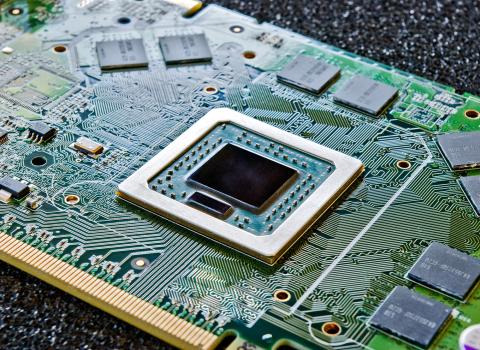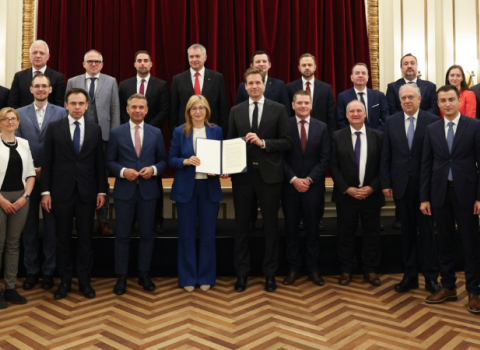The EU’s research partnership on semiconductors is launching three new calls with a total budget of €216M, including a joint call with South Korea

The Chips joint undertaking, the EU public-private partnership which funds semiconductor research, has launched a call for collaborative research projects with South Korea.
The call is one of three launched this week with a total EU budget of €216 million.
“We are very happy to see the first joint call launched by Chips JU and the National Research Foundation of Korea (NRF),” said Woohyun Cho, director general of the Korea-EU Research Centre in Brussels.
The call for early-stage, pre-commercial research projects is open to universities, research and technology organisations, and private companies. Applications should include both a Horizon Europe consortium and a Korean consortium.
The EU has allocated €6 million to the call, and is expected to dedicate €1.5 million to each successful project, with South Korea contributing an equal amount.
South Korea and the European Commission launched the Korea-EU Digital Partnership in June 2023 to strengthen cooperation and economic resilience in the digital sector. To foster the relationship, the partners will hold the first South Korea-EU semiconductor researchers forum in Brussels on 25-26 March.
Semiconductors are one of the main focus areas of the partnership, along with high performance computing and quantum technology, 5G and beyond, platform economy, artificial intelligence, and cybersecurity.
“We hope that through these initiatives, researchers of Korea and Europe improve their understanding of each other, and build networks for the future cooperation in Horizon projects,” said Cho.
“In Korea, there is still a lack of awareness of the European research and innovation landscape, and in order to promote joint research between Korea and the EU through Horizon Europe in the future, a research network must first be established.”
Formal negotiations are underway for Korea’s association to Horizon Europe and are expected to be concluded this year.
Yale Song, network and policy officer at the Korea-EU Research Centre, said semiconductors are a “top priority” for both partners, as illustrated by the fact the Korean science minister, Lee Jong-ho, is an expert on the technology.
“The fact that Korea and the EU are cooperating in this area suggests that we are very important partners for research and innovation,” said Song.
Technical details
The call says the purpose of the collaboration is to strengthen research and innovation relations, cooperate in pre-competitive projects on areas which are in the interest of both jurisdictions and build trust for further cooperation.
The technical details say the focus will be on “heterogeneous integration and neuromorphic computing technologies for future semiconductor components and systems.” Neuromorphic computing involves emulating how the human brain processes information, with the aim increasing processing power but using less electricity.
International collaboration is central to the EU’s semiconductor strategy and to the Chips Act adopted in 2023. Europe is aware that it cannot control every aspect of this complex, global supply chain, and needs to work with reliable partners to secure its supply of this key technology.
At a Science|Business conference in December, researchers from the EU and the US called for more cooperation between the two regions, as so far there is nothing as official as the EU’s joint call with Korea.
The Chips JU has launched two other calls, one for innovation actions at higher technology readiness levels and another for research and innovation actions at lower technology readiness levels, both of which will run in two phases.
One of the joint undertaking’s main tasks is to implement the Chips for Europe Initiative, which was created under the Chips Act to bridge the gap between research and innovation and industrial exploitation. The initiative draws funding from Horizon Europe and the Digital Europe programme.
This week’s calls are funded by Horizon Europe and are a continuation of the activities of its predecessor, the Key Digital Technologies JU.
This is the second set of calls by the Chips JU, following four pilot line calls announced in December 2023. These pilot lines will get €1.67 billion in EU funding and should be deployed by the summer, to act as a bridge for scaling up laboratory research for deployment in industry.
The pilot lines are part of the Chips for Europe Initiative, and the joint undertaking is planning five additional initiative calls in 2024, to be published on 8 July, with an estimated EU expenditure of up to €660 million, according to its multiannual work programme.
This will include a call for a cloud-based design platform which will help users, especially academia, startups and SMEs, to design and develop their chips at a much lower cost.
This will be joined by a call for one or more additional pilot lines, and another for preparatory action on quantum chip pilot lines and supporting technology components.
The final call will be for competence centres, which will help to develop skills, and will provide users with access to infrastructure such as the design platform and pilot lines.





 A unique international forum for public research organisations and companies to connect their external engagement with strategic interests around their R&D system.
A unique international forum for public research organisations and companies to connect their external engagement with strategic interests around their R&D system.